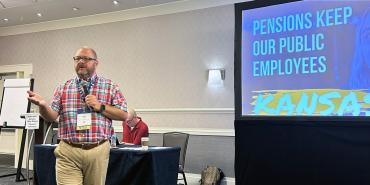Union work can be challenging, particularly in red states. But that hasn’t stopped leaders like Ron Hobert, president of AFT Kansas, and Jason Roberts, of the Kansas University Nurses Association, from forging ahead. In their Sunday morning workshop at AFT TEACH, “Building Success: Strategies for Thriving Unions in Middle America,” the two veteran organizers shared hard-earned insights on recruitment, bargaining, legislative advocacy and leadership development.
Hobert opened by sharing what inspired this session. Having attended several sessions in the past that celebrated advancements in blue states, he felt that union activists in red states needed different strategies. Without the supports available in blue states, he said, it’s hard “to fight this battle every single day.”
Roberts agreed. “It is difficult particularly in red states, where the battles are different and the ways that we have to do business are different,” he said. Noting that “our language, our verbiage, our demeanor” often need to shift, he assured attendees, “that doesn’t mean that we cannot be successful, and that’s what we always have to remind ourselves.”
The foundation of union power, both agreed, is membership.
“Recruitment is difficult because there are so many competing forces, but it is the most important thing that we can do for ourselves, because recruitment is our power. We don’t have power for anything if we don’t have the members,” said Roberts.
The focus on doing things to increase our membership pays off in the long run, said Hobert. “In buildings where everyone is a member, the collective voice is very powerful, but it takes time and it takes work.”
That effort, however, is often made more difficult by anti-union rhetoric from administrators and legislators. “We have anti-union principals, anti-union administrators. They hear bad things from the Legislature about the unions, and people are like, ‘Oh, I don’t want to be part of that,’ ” said Roberts. “But that doesn’t mean that we cower and walk away. … We center our voices on marginalized workers.”
Both speakers emphasized the need for unions to reflect the diversity of their potential membership—not just in their mission, but in their materials and messaging. In addition to producing fliers and other literature in multiple languages, Roberts pushed attendees to ask: “Do the pictures that we use display some of our members of color or of immigrant status?”
On the topic of collective bargaining, Roberts urged unions to do more than win good contracts—they must ensure members understand and use them. He also encouraged using storytelling at the bargaining table. “We’re constantly gathering those stories and those realities from our members so that we can use them at the table,” said Roberts. Hobert added that contract language is an opportunity to advance issues like gender equity and cultural inclusivity—especially when unions share strategies across states.
Legislative engagement can feel like a brick wall in red states, but both leaders said it’s critical to build bipartisan relationships. “Building relationships with lawmakers is so hard, particularly when you are a union and you’re in a red state, but it is possible,” said Roberts. He has done it by taking members to the Legislature to meet with Republicans, “because we wanted to remind them that we were constituents and that what they did affected us.”
Perhaps the most urgent issue, Hobert said, is preparing new leaders to carry the movement forward. “Building leadership capacity is important. It’s important to find those young people, because we’re not going to be around forever.”
He described how Super Saturday trainings—workshops for union presidents, executive boards and members—helped develop leadership skills, educate members on procedures like grievances and ultimately grow membership across Kansas locals. The key is to make training accessible, practical and engaging, while continuously supporting emerging leaders in their professional development.
[Adrienne Coles]

